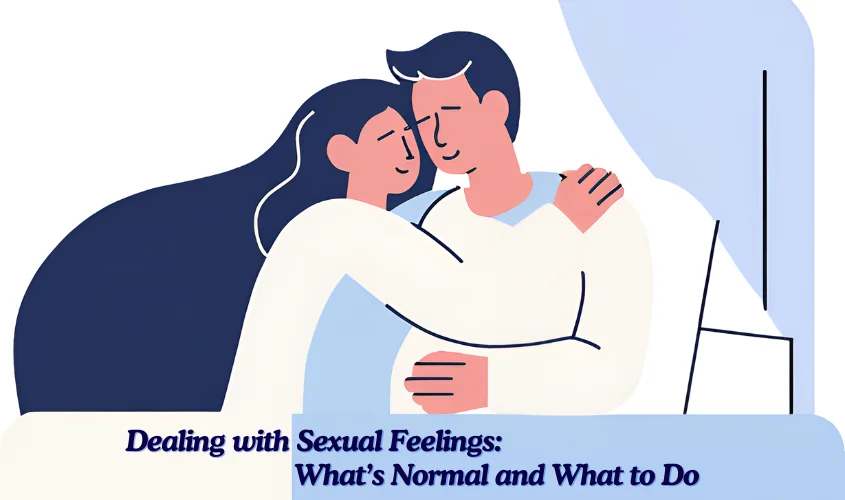
- 11.10.2024
- Sex Education
Understanding and Managing Your Sexual Feelings During Puberty
Adolescence is a time of change, both physically and emotionally. As your body goes through puberty, you might start experiencing a wide range of sexual feelings. These feelings can be confusing, exciting, or even overwhelming. This article is designed to help you understand what you’re going through and provide some tips on how to handle those emotions in a responsible and healthy way.
Understanding Sexual Feelings During Adolescence
During adolescence, your body produces more hormones like estrogen and testosterone, which can lead to new and strong sexual feelings. These are a normal part of growing up and can vary from person to person. Some teens might feel these emotions intensely, while others might not experience them as strongly. It’s important to understand that whatever you’re feeling is part of your natural development.
What Triggers Sexual Feelings?
Many things can trigger sexual feelings, including physical changes in your body, interactions with others, or even media exposure. As your body matures, you might notice that you’re attracted to other people in ways you hadn’t experienced before. You may also start to develop emotional connections that seem to blend with these new physical sensations. These experiences are a normal part of puberty.
Normalizing Your Emotions
It’s crucial to normalize the fact that you’re experiencing sexual thoughts or feelings during puberty. Feeling embarrassed or ashamed can be a common reaction, but these emotions are part of your development. Rather than judging yourself, acknowledge these feelings as a healthy part of your growth.
How to Express Your Sexual Feelings in a Healthy Way
As a teenager, learning how to express your sexual feelings in a responsible way is important for your emotional and mental well-being. You might feel pressured to act on these emotions immediately, but it’s okay to take your time to understand them before deciding how to act.
Communicating About Your Feelings
One of the most important aspects of expressing your sexual feelings is learning how to communicate them. If you’re in a relationship, talking openly with your partner about your feelings, desires, and boundaries is key to a healthy connection. Respect is mutual, and your partner’s emotions and boundaries are just as important as yours.
Setting Boundaries
When expressing your sexual feelings, setting personal boundaries is essential. Boundaries help define what you’re comfortable with emotionally and physically. Being able to communicate these boundaries with a partner—or even with yourself—is a crucial step in developing a healthy relationship with your feelings.
Safe Spaces to Discuss Your Emotions
If you’re feeling overwhelmed or confused by your emotions, it’s helpful to talk to someone you trust. This could be a parent, guardian, or another trusted adult, such as a counselor. If talking to an adult feels uncomfortable, finding reliable resources like sexual health clinics or online forums specifically aimed at teens can provide a safe space to explore your sexual feelings.
Recognizing the Difference Between Emotional Intimacy and Physical Attraction
One of the most confusing aspects of puberty can be understanding the difference between emotional intimacy and physical attraction. Often, the two can feel intertwined, but they are different aspects of relationships.
What is Emotional Intimacy?
Emotional intimacy involves forming a deep, personal connection with someone based on trust, care, and mutual respect. You might feel emotionally intimate with a close friend or family member, even without any physical attraction involved. It’s about feeling safe to share your thoughts, dreams, and vulnerabilities with another person.
Understanding Physical Attraction
Physical attraction, on the other hand, is about feeling drawn to someone’s appearance or physical presence. It’s the feeling you might get when you have a crush on someone or feel ‘butterflies’ when you’re around them. It’s important to understand that physical attraction can happen without emotional intimacy, and vice versa.
Balancing the Two in Relationships
Healthy relationships often involve a balance between emotional intimacy and physical attraction. While physical attraction is natural, a strong relationship is built on emotional intimacy and mutual respect. Prioritizing emotional closeness can help ensure that you’re making thoughtful, informed decisions about your sexual feelings.
Tips for Navigating Sexual Feelings Responsibly
Managing sexual feelings responsibly is crucial as you grow into adulthood. Here are some tips for navigating these emotions in a healthy way:
- Take your time: Don’t feel rushed into acting on your feelings. It’s okay to wait until you’re emotionally and mentally ready to engage in sexual activities.
- Communicate openly: Whether you’re in a relationship or not, talking about your feelings with trusted individuals helps you gain perspective and reassurance.
- Set boundaries: Establish what you’re comfortable with and stick to your decisions.
- Practice self-care: Take care of your mental health by engaging in activities that make you feel good about yourself, such as exercise, hobbies, and spending time with loved ones.
Getting Support and Finding Resources
If you’re feeling unsure about your sexual feelings, it’s important to seek support. You don’t have to go through this alone, and talking to someone you trust can help you better understand what you’re experiencing.
Where to Get Help
Here are some resources where you can learn more or seek help:
Using the Selin App to Set Reminders for Healthy Sexual Habits
The Selin Period Tracker app is a great tool to help you manage your sexual health. You can set reminders to track your cycle, ovulation, and fertility, which can help prevent pregnancy if you’re not ready. Your partner can also use the app to set reminders to buy condoms or stay updated on your cycle, helping both of you stay responsible in your sexual relationship.











